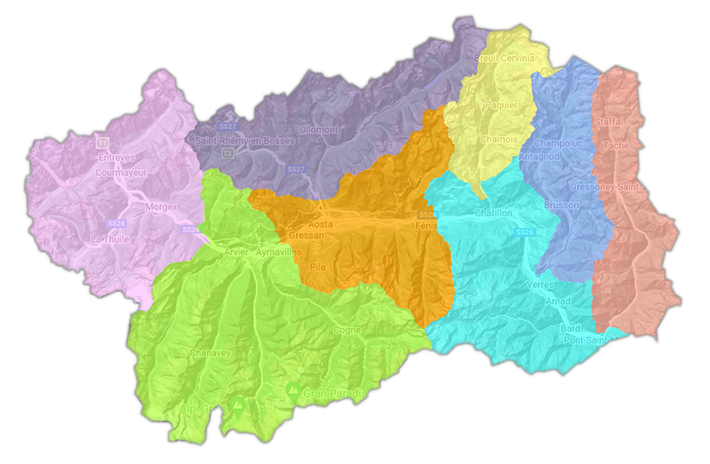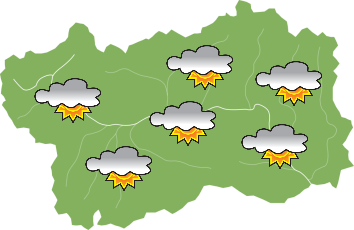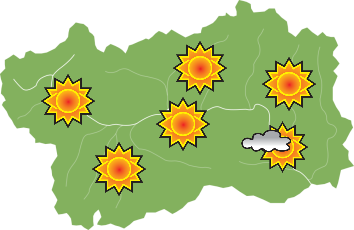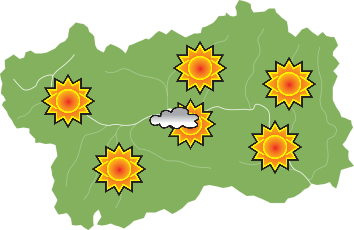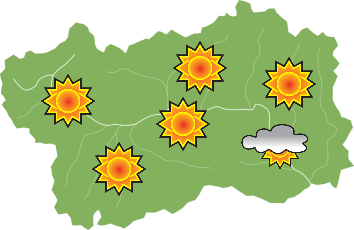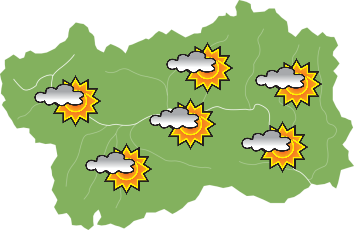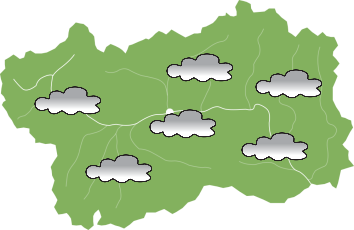History
Formerly property of the Bishops of Aosta, then restored in the 15th century by Ibleto of Challant, Issogne Castle’s current appearance developed between 1490 and 1510 under George of Challant, the prior of Sant’ Orso, who restored and transformed it into a luxurious residence for his cousin Margaret de La Chambre and her son Philibert. These works transformed Issogne castle into a luxurious Renaissance residence. After various owners, it was bought by the artist Vittorio Avondo in 1872 who restored it and donated it to the State in 1907. Today the castle belongs to the autonomous Region of Aosta Valley. Not far from the castle are the ruins of its dove house.
The visit
Entering the castle, the courtyard offers its walls, painted with the coats of arms of the Challant family and of the dinasties related to them. In the centre of the courtyard is the famous wrought-iron pomegranate fountain, symbol of the Challant family.
Then comes the hall frescoed with the famous “lunettes”, scenes from everyday life (the guards, the butcher and the baker, the greengrocer market, the tailor’s workshop, the pharmacy and the grocer).
The visit of the apartments of the castle includes:
- on the ground-floor, the dining room, the kitchen and the Baron’s hall, where you can admire a beautiful stone fireplace with the Challant crest alongside a lion and a griffin, painted wooden beams on the ceiling and frescoes on the walls depicting landscapes, hunting scenes and the Judgment of Paris;
- on the first floor, the chapel with finely decorated, pointed arch vaults, frescoes on the walls and a Gothic altar in carved, gilded wood in a Flemish triptych,and the Countess’s room with painted oratory;
- on the second floor, the “King of France’s room”, with a coffered ceiling decorated with lilies and a fireplace with the French Vallois dynasty shield, and the room called the “Knights of St. Maurice” with a beautiful, coffered ceiling with the Order’s cross painted on it.
Avondo’s apartment
Since 2018, an emotional and multimedia space dedicated to Vittorio Avondo, the illustrious owner of the Issogne manor, enhances and enriches the castle’s offer by highlighting its events of the late 19th century.
Born in Turin in 1836, passionate about painting from his youth, after a period lived in Rome to paint the landscapes of the countryside of the region, Avondo dedicated himself to the study of the art of antiquity and in 1865 he followed the reorganization of the Bargello Museum in Florence.
Then he returned to Turin where, from 1891, he became director of the Museo Civico.
The purchase and restoration, with Alfredo D’Andrade, of Issogne Castle, allowed him to expand his skills and collections of medieval art, which led him to collaborate with D’Andrade himself in the construction of the Medieval village in Turin (1884).
How to get here
From Aosta by public transport:
1.Bus 110 – Aosta – Pont-Saint-Martin, running every day, bus stop ‘Verrès – Brambilla’. Timetable available on aosta.arriva.it. Continue on foot for about 10 minutes towards the cemetery.
2.Bus Circolare Carema – Montjovet, running from Monday to Saturday (no holidays), from ‘Verrès – Cimitero’ bus stop to ‘Issogne – Castello’ bus stop. Timetable available on vitagroup.it.
or
1.Trenitalia replacement bus, running every day, from Aosta to Verrès. Timetable available on trenitalia.it. Continue on foot for about 5 minutes towards the cemetery
2.Bus Circolare Carema – Montjovet, running from Monday to Saturday (no holidays), from ‘Verrès – Cimitero’ bus stop to ‘Issogne – Castello’ bus stop. Timetable available on vitagroup.it
Bus tickets can be bought at the authorised ticket offices or directly on the bus without any additional fee. Cash or card payments are accepted on the bus.



